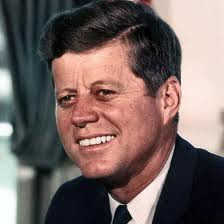By: Ray Hanania
 A lot of people believe that skeptics of the assassination of John F. Kennedy are driven by a belief that there was a second gunman besides Lee Harvey Oswald.
A lot of people believe that skeptics of the assassination of John F. Kennedy are driven by a belief that there was a second gunman besides Lee Harvey Oswald.
That’s not true.
The real problem lingering in the minds of so many people of the 1960s Kennedy generation is far more sinister.
It involves FBI Director J. Edgar Hoover, Vice President Lyndon Baines Johnson, the New Orleans and Dallas mafia, and the Dallas news and political establishment.
Sometimes, conspiracies are not planned but occur through a process of “natural selection,” a Darwinian theory that I like to call coincidental conspiracies, or “conspiradentals.”
Conspiradentals are conspiracies that result not from coordinated planning, but from parallel interests that all come together not by accident but without any planning.
The Kennedys were hated by four very powerful forces in 1963: Hoover and the FBI; Johnson and his staff; the New Orleans and Dallas connected Mafia; and, the Dallas media and political establishment that Johnson controlled.
Anti-conspiracy apologists for the Warren Commission, like attorney Vincent Bugliosi, have argued that all the evidence pointed to Oswald and they ridicule the conspiracy theorists claiming that the Warren Commission examined everything carefully, including the possibility of other gunmen.
But what the Warren Commission missed in its rush to close the Kennedy tragedy was the role that certain powerful people played to make it easy for Kennedy to have been killed. And you must first start with Hoover and the FBI.
Oswald was no stranger to Hoover and the FBI. They knew him, investigated him, monitored his activities and repeatedly attempted contact with him in the year before the killing.
In fact, when Oswald, who had lived in New Orleans, was arrested, he scolded FBI agents for “harassing” his Russian wife, Marina.
You don’t have to imagine that scenario, today. It’s all over the front pages. Boston Bombing suspect Tamerlan Tsamaev was on the radar screen on Federal authorities who are now accused, maybe for political reasons, of failing to act. You have to ask, could they have prevented the Boston bombings if they had taken the information more seriously?
In the case of Hoover and Kennedy, Hoover hated Kennedy and Kennedy was planning to oust him as FBI director after his anticipated re-election in November 1964.
Kennedy was also going to replace Johnson on the ticket. And Johnson was very close to leaders of the Dallas Italian American community, including several who were closely tied to the New Orleans mafia.
The Kennedy’s, including Attorney General Robert F. Kennedy, were putting unprecedented pressures on organized crime.
The Dallas Morning News was one of the most vicious anti-Kennedy newspapers in the country, reflecting the hatred and animosity that was stewing in Johnson’s backyard. Just moments before his murder, Lady Bird Johnson turned and noted that boisterous welcome Kennedy was receiving as their motorcade turned into Dealey Plaza in Dallas, citing it as evidence that not everyone in Dallas hated him.
Oswald was not someone who stepped out of the darkness to kill a president in broad daylight in front of hundreds of witnesses. He had the benefit of a system that was hostile to the president, which could have made it extremely favorable for him to achieve his nefarious goals.
“Conspiradentals” is what the Johnson-appointed Warren Commission never investigated, and what apologists like Bugliosi never weighed, including the role of the mob, the failure of the system to protect the president and maybe even failure to have taken Oswald more seriously
(Ray Hanania is an awardwinning columnist. Reach him at www.TheMediaOasis.com and follow him on Twitter at @RayHanania.)










